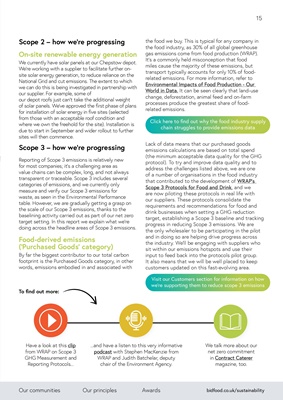
15
bidfood.co.uk/sustainability
Our principles
Our communities Awards
Scope 2 - how we're progressing
On-site renewable energy generation
We currently have solar panels at our Chepstow depot.
We're working with a supplier to facilitate further
on-site solar energy generation, to reduce reliance on
the National Grid and reduce emissions. The extent
to which we can do this is being investigated in
partnership with our supplier. For example, some of
our depot roofs just can't take the additional weight
of solar panels. We've approved the first phase of plans
for installation of solar energy in 5 sites (selected on
those with an acceptable roof condition and where
we own the freehold for the site). Installation is due
to start in September and wider rollout to further
sites will then commence.
Scope 3 - how we're progressing
Reporting of scope 3 emissions is relatively new
for most companies; it's a challenging area as
value chains can be complex, long, and not always
transparent or traceable. Scope 3 includes several
categories of emissions, and we currently only
measure and verify our scope 3 emissions for
waste, as seen in the Environmental Performance
table. However, we are gradually getting a grasp on
the scale of our scope 3 emissions, thanks to the
baselining activity carried out as part of our net zero
target setting. In this report we explain what we're
doing across the headline areas of scope 3 emissions.
Food-derived emissions
('Purchased Goods' category)
By far the biggest contributor to our total carbon
footprint is the Purchased Goods category, in other
words, emissions embodied and associated with
the food we buy. This is typical for any company in
the food industry, as 30% of all global greenhouse
gas emissions come from food production (WRAP).
It's a commonly held misconception that food
miles cause the majority of these emissions, but
transport typically accounts for only 10% of foodrelated
emissions. For more information, refer to
Environmental Impacts of Food Production - Our
World in Data. It can be seen clearly that land-use
change, deforestation, animal feed and on-farm
processes produce the greatest share of foodrelated
emissions.
Lack of data means that our purchased goods
emissions calculations are based on total spend
(the minimum acceptable data quality for the GHG
protocol). To try and improve data quality and to
address the challenges listed above, we are one
of a number of organisations in the food industry
that contributed to the development of WRAP's
Scope 3 Protocols for Food and Drink, and we
are now piloting these protocols in real life with
our suppliers. These protocols consolidate the
requirements and recommendations for food and
drink businesses when setting a GHG reduction
target, establishing a scope 3 baseline and tracking
progress in reducing scope 3 emissions. We are
the only wholesaler to be participating in the pilot
and in doing so are helping drive progress across
the industry. We'll be engaging with suppliers who
sit within our emissions hotspots and use their
input to feed back into the protocols pilot group.
It also means that we will be well placed to keep
customers updated on this fast-evolving area.
We talk more about our
net zero commitment
in Contract Caterer
magazine, too.
Have a look at this clip
from WRAP on Scope 3
GHG Measurement &
Reporting Protocols...
...and have a listen to this very informative
podcast with Stephen MacKenzie from
WRAP and Judith Batchelar, deputy
Chair of the Environment Agency.
To find out more:
Click here to find out why the food industry supply
chain struggles to provide emissions data
Visit our Customers section for information on how
we're supporting them to reduce scope 3 emissions